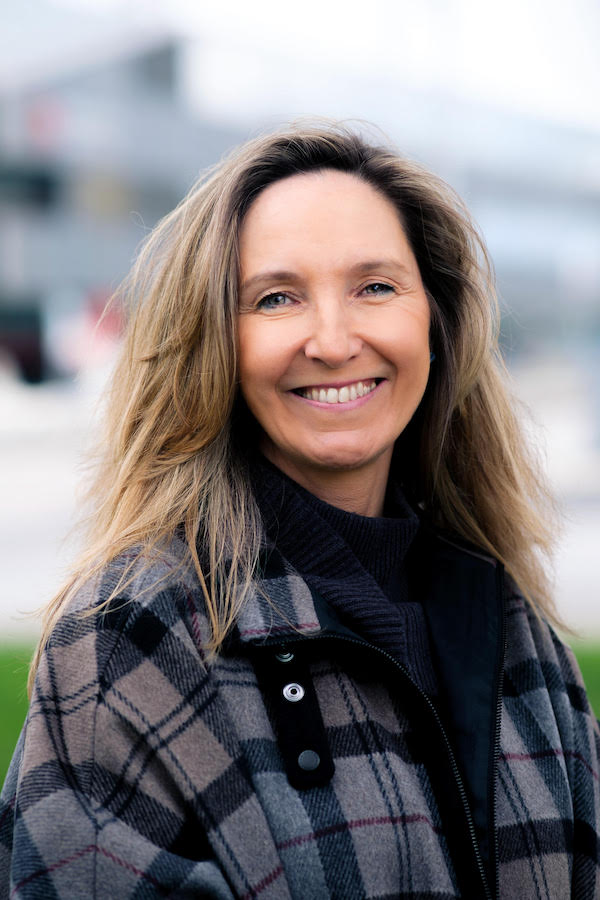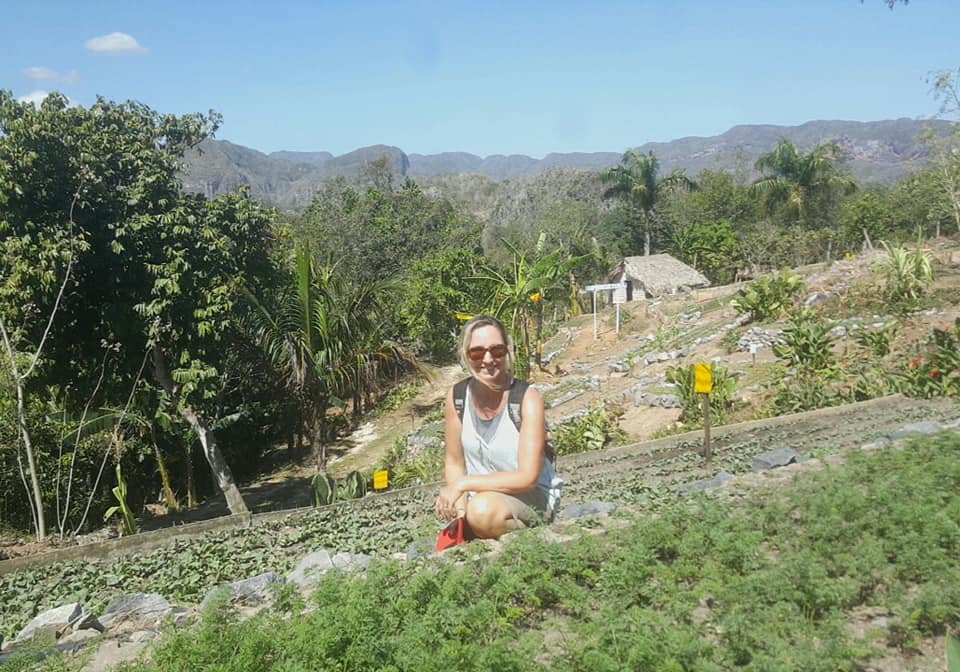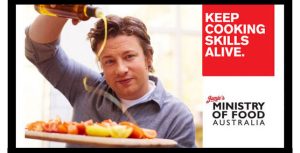Why Don’t We Have A Minister for Food?

That’s the question which reverberated with me for days after hearing Professor Alana Mann’s interview with journalist Benjamin Law about her latest book Food In A Changing Climate (Emerald Publishing 2021).
I’d been invited to Sydney’s Powerhouse Museum a couple of weeks ago to listen to the 49th podcast recording in a series entitled 100 Climate Conversations.
By the time the hour was up, I was brimming with hundreds more questions.
Some were political such as why do we have a Minister for the Environment & Water (The Hon. Tanya Plibersek) but not a Minister for Food? Why don’t we have a National Food Plan? Whose responsibility is it to enact one?
Others included whether new technologies such as $330,000 lab-made burgers might be the answer to food insecurity? Who owns those technologies? Is the Blue Revolution the answer to over-fishing? How much energy is used to ship food around the world? Can GMOs save us from food insecurity?
Alana Mann is well-placed to probe many of these questions given her background as Education Manager working with journalists on content development at Fairfax Media then in media studies at the University of Sydney and now as Professor of Media Studies at the University of Tasmania. She is also Director of Sydney University’s Food Lab, a food business incubator, and a member of the Australian Food Sovereignty Alliance.
“As a media scholar, I’m often asked why I talk about food,” she says. “Food is a communication problem.
“A lot of my work is about who has a voice in these issues and how to mobilise people to translate a lot of complex, difficult issues so they feel they have agency.
“It’s an interesting paradox that we need to grow food, yet 40% of carbon emissions come from food production if you include land clearing, transportation and distribution.
“Issues to do with climate change are huge. How will it affect food availability? Some foods will disappear, some places will become more productive. Temperate zones will become hotter, tropical zones will become drier. The most vulnerable live in tropical zones. People who live close to the coast in places such as Mumbai, Chennai, even New York, will become climate refugees.”
Alana’s childhood in coastal Queensland gave her an awareness of the complexities of the food system.
Growing up at Hervey Bay, her first memories are of her father tapping the barometer every morning for the weather forecast.
“My parents owned a fishing business on a beautiful protected waterway near K’gari/Fraser Island. My father would often leave at dawn and return after lunch. He always wanted to be out in the water, lines in, by daybreak.
“My mother ran the business and made hundreds of chicken sandwiches every day for the tourists. I helped on the boats. We grew up knowing about the tides. It was literally all hands on deck.”
The family lived on a diet of fresh fish and fresh veggies from their garden. They also kept chooks and ducks.
“We didn’t buy a lot of food. As a child everyone lived like that. I can’t believe I used to complain about being given crumbed whiting fillets for breakfast,” she added with a laugh.
“My father knew exactly where to position the boat over schools of fish for the tourists. They’d haul in huge amounts and he’d check they weren’t over-size.
“You’ve got enough now,” he’d caution them.
“During my childhood I saw numbers of fish decline. Patterns of fish stocks are now changing quickly. The red snapper my father used to catch is moving south due to warming waters. Acidification of the ocean will kill tiny organisms which are at the bottom of the food chain and on which larger fish feed.

Beautiful waterway at Hervey By, Queensland

Food Lab Food Truck
It’s a cascading effect and is going to be dramatic.”
During the 1970s, her parents joined the Fraser Island Defenders Operation (FIDO) to protest sand mining on nearby Fraser Island and deforestation further inland.
“This gave us a new sense of community and made me aware of the importance of looking after the environment.”
Alana’s initial research, after moving out of journalism and into the academy, looked at La Via Campesina (The Peasant’s Way), an international organisation of family-based farmers which was established in Mons, Belgium, in 1993, in response to the World Trade Organisation (WTO).
“They realised the WTO would only listen to big farmers, big corporations and big governments, not to small farmers. They’ve expanded to 90 countries and have been so successful that they describe themselves as the world’s largest social movement.
“They’re now part of discussions at the Food and Agriculture Organisation (FAO) and have been able to enact an agenda which is having an effect on global policy.”

Catriona Macmillan (left), with other team members, who worked with Alana at Sydney University’s Food Lab. Catriona compiled Australia’s first Organic Food Directory
These farmers, she says, are talking about food sovereignty: having the agency to determine what you eat, who grows food, how it’s grown and who benefits from it.
In the Cerrado, a tropical savanna region in eastern Brazil, she visited people living on the sides of the street who had been displaced by sugar cane being grown for ethanol and saw large-scale farms where soy was grown to feed pigs in China.
Returning to Australia after her international research, she saw that farmers here have created many local resilient supply chains and are listening to traditional owners about land management techniques.
“There are hundreds of small movements around the world doing a great job of communicating about our food system,” she says. “One thing they all have in common is that they’re place-based. But politics gets in the way.”
She cites former Senator Nick Xenophon’s attempts in 2014 to protect the name barramundi so that it only applies to Australian-caught fish. He proposed a Bill, but it wasn’t passed.
“If the French can protect champagne and the Greeks fetta, surely Australia can protect barramundi,” he said.
“When you consider the origin of the name barramundi, an Indigenous name, the protection of the name barramundi should apply to Australian-caught fish or Australian-farmed fish.”
As a member of Australian Food Sovereignty Alliance, Alana emphasises how farmers in Latin America, where much of her research was conducted, had to struggle for basic rights, including the right to food.
“We need to have this conversation in Australia because food cannot be divorced from the land. Land also means your corner shop, your backyard, your community garden.
“Food sovereignty is a word we wrestle with and is translated poorly in the Western world. It means having the agency to determine what you eat, who grows food, how it’s grown and who benefits from it.”
The Australian Food Sovereignty Alliance was established in 2010 and is a grassroots farmer-led food movement trying to create a democratic system in which people can create, manage and choose their food system.”
One of the reasons Alana wrote Food In A Changing Climate is because of her frustration with how much of the onus is put on individual consumers.
“Anyone can see that food affordability is becoming a real problem. Expecting consumers to eat ethically is impossible if you don’t create an enabling environment.
“The onus should be on policymakers to provide people with the means to eat healthy affordable food because not everyone can afford to shop at an organic farmers market. So how do we do that?”
Nor does she think it fair to tell people what to eat or to prescribe diets, given that food is such a personal, emotional and important cultural part of our lives.
One of her constant refrains is how vulnerable we are. This was highlighted during the Covid-19 Pandemic when shipping ports around the world closed.
“The food rots! It’s one thing to grow enough food but you have to be able to get it to people which means food waste is a big problem.
“It’s not just something which happens when food slides off our plates at the end of a meal. It’s happening post-harvest on the way to market in a lot of countries.”

Alana on the terraces in Pinar del Río Province, Cuba, where the farmers’ movement is very strong and committed to agroecology as an outcome of the fall of the Soviet Union, which cut off their supplies of fossil fuel, including fertiliser
caption text

“Food in A Changing Climate” by Alan Mann (Emerald Press)

60% of the world’s calories comes from just three to four grains
“Actually, just some of us are lucky,” she adds. “According to Food Bank, there are 2 million food insecure people in Australia, but there are actually a lot more than that. It’s a hidden statistic. The hungry aren’t who you think they are.”

Jamie’s Ministry of Food is still flourishing in Ipswich, Queensland

Bravo Sheridan.
Such a vital issue, we are all affected by food insecurity.
Thankyou for the reminder of its importance for all of our futures.
Thank you Angela, we sure need a Minister for Food & also National Food Plan to deal with the many difficult, complex issues in the food world. I hope someone starts a movement to address this 🙂
Sheridan
Fabulous summary of many complex issues relating to management of foods and responsibility going into the future. Sovereign foods is the term now heard most- it’s a First Nations battle cry here. Hard to shake off its connotations for those of us who remember it was once Two and sixpence or comprehended the term “my sovereign liege” for the Queen – soon maybe King.
It’s ridiculous the first peoples of Australia can’t claim barramundi if France claims champagne – so many plant foods too are now being commercially grown and only known because of Aboriginal peoples generous sharing of knowledge and bounty.
Thank you Sheridan,
This is lovely piece of work where you have managed to distill vital and meaningful information from an entire book, podcasts and interviews.
I agree that we take Australia’s current food security for granted, while we minimise the millions in our own country suffering food insecurity and real hunger. When you put this alongside the increasing threats to our food sources it really is surprising we don’t have a Minister or Assistant Minister for food instead of it being implied within Water, Agriculture, Environment.
Thanks Jen. I also remember when a sovereign meant 2 shillings & 6p!
Sheridan
Thanks Susan, Alana Mann is fantastic communicator and she’s now Professor of Media at the Uni of Tasmania, not far from you.
Sheridan
Loved this article and the insights Sheridan!
Recently bought the cookbook One Pot, Pan, Planet: A Greener Way to Cook for You, Your Family and the Planet by Anna Jones
It’s a lovely book. Let me know if you would like to borrow it
Thanks Lozzie, I’d love to borrow it sometime 🙂
Sheridan
I like the idea of the iconic name ‘barramundi’ being legally protected in some way for Australian caught or farmed fish. This could even help local barramundi farmers since they currently compete with large quantities of imported ‘barramundi’ from southeast Asian countries. However, fairly recent genetic work has shown that at least some of the imported fish are different species, with different scientific names (albeit closely related).
I appreciate your comment Julian and hope another politician attempts to get this off the ground – it’s ridiculous that imported “barramundi” are actually different species.
Sheridan
On March 15, 2023, I received this reply from the the Hon Mark Butler’s office. Butler is Minister for Health and Aged Care.
Ref No: MC23-00339
Ms Sheridan Rogers
sheridan@sheridanrogers.com.au
Dear Ms Rogers
Thank you for your correspondence of 13 February 2023 to the Minister for Health and Aged Care, the Hon Mark Butler MP regarding a minister for food and a national food plan. The Minister has asked me to reply.
I appreciate your concern regarding the changes in the food system in recent decades and the flow on effects that this has to the health of Australians and the environment. Australia benefits from a strong and reliable food regulatory system which ensures that our food is safe to eat. The Food Regulatory System involves several interconnected laws, policies, standards and processes that are based on scientific evidence and expertise.
The ministerial responsibility for food sits with the Assistant Minister for Health and Aged Care, the Hon Ged Kearney MP. Assistant Minister Kearney chairs the Food Ministers Meeting, a forum for all ministers who are responsible for food policy in state and territory governments across Australia as well as the New Zealand Government. The Food Ministers Meeting oversees the Food Regulatory System and are the decision makers in the system. This ensures all governments are working together with a common voice when reviewing food policies and safety standards. To ensure a holistic, national view of food policies issues, Senator the Hon Murray Watt, Minister for Agriculture, Fisheries and Forestry also participates in this meeting.
Food Standards Australia New Zealand (FSANZ) is an independent scientific agency whose role it is to develop food standards. These food standards cover food safety, food composition, food labelling, food additives and primary production. Once a standard is developed by FSANZ it must be approved by the Food Ministers Meeting and is then accepted into state and territory legislation for enforcement at a local level. The Department of Agriculture, Fisheries and Forestry enforce food standards at the Australian border to ensure that all internationally imported foods meet the same standards.
More information about food regulation in Australia, including the Food Ministers Meeting, is available at http://www.foodregulation.gov.au.
Australia does not currently have a national food plan, as mentioned in your correspondence, however there are other pieces of work currently under way to inform food and nutrition policy at a national level. The CSIRO is currently developing an ‘Australian Food Systems Roadmap’, due for release in 2023. This roadmap will investigate the challenges faced by Australia’s food system, within a national and global context, and explore opportunities for sustainable transformation. The Australian Government has contributed funding to support this project and the Department of Health and Aged Care, and the Department of Agriculture, Fisheries and Forestry provide expertise via the CSIRO’s project steering committee.
Additionally, the Department of Health and Aged Care is also in the early scoping stages of developing a National Nutrition Policy Framework. This is a policy action under the National Preventive Health Strategy. The Framework intends to take a multi-sector, whole of government approach to guide policy action and improve eating patterns in Australia. The Department will work closely with state and territory governments, non government organisations and other stakeholders throughout 2023 as this work progresses.
Finally, Senator the Hon Murray Watt, Minister for Agriculture, Fisheries and Forestry, has referred an inquiry into food security to the House Standing Committee on Agriculture. The Committee will examine ways to strengthen and safeguard food security in Australia, including the threat of climate change on food production. This reflects how important the Australian food system is as a component of the Australian economy, and that the causes of food insecurity are complex and of both national and global importance.
Thank you for writing on this matter.
Yours sincerely
Carita Davis
7 March 2023